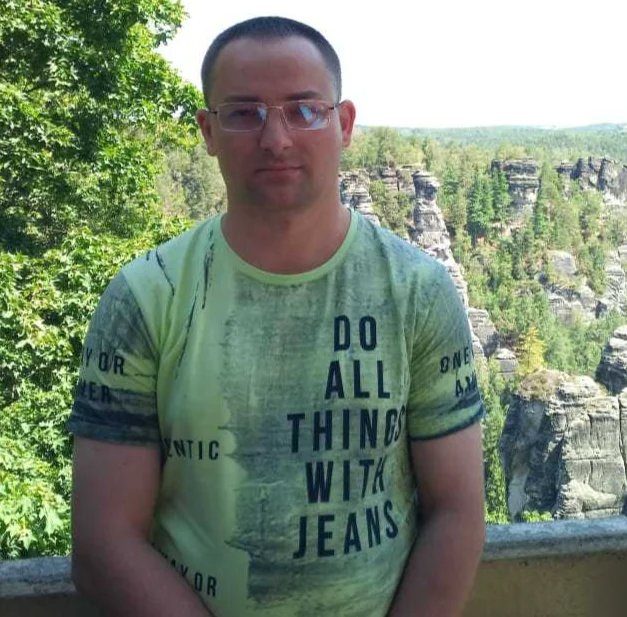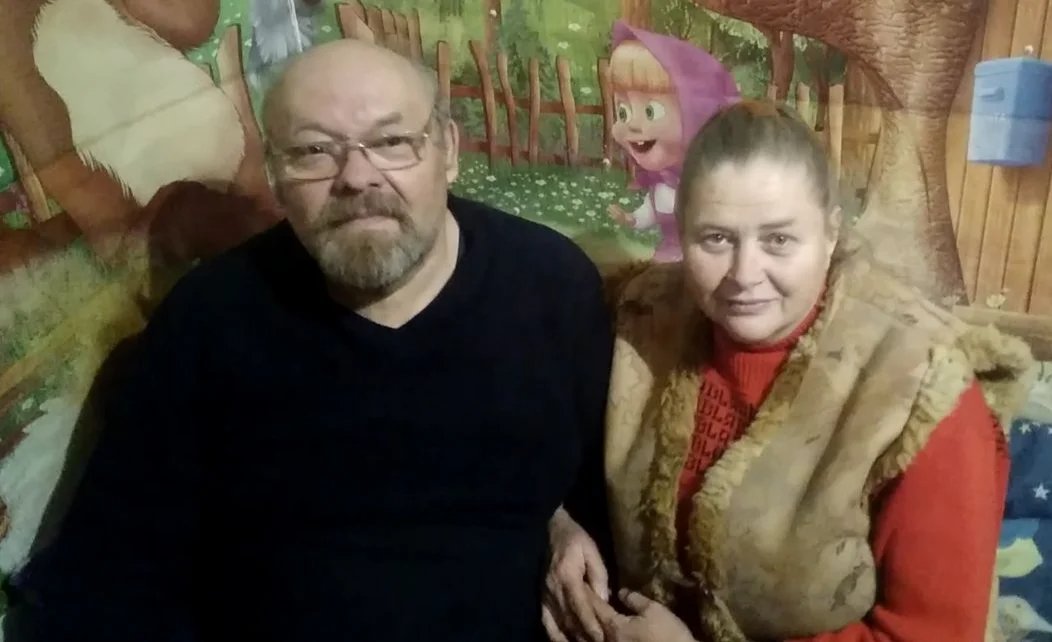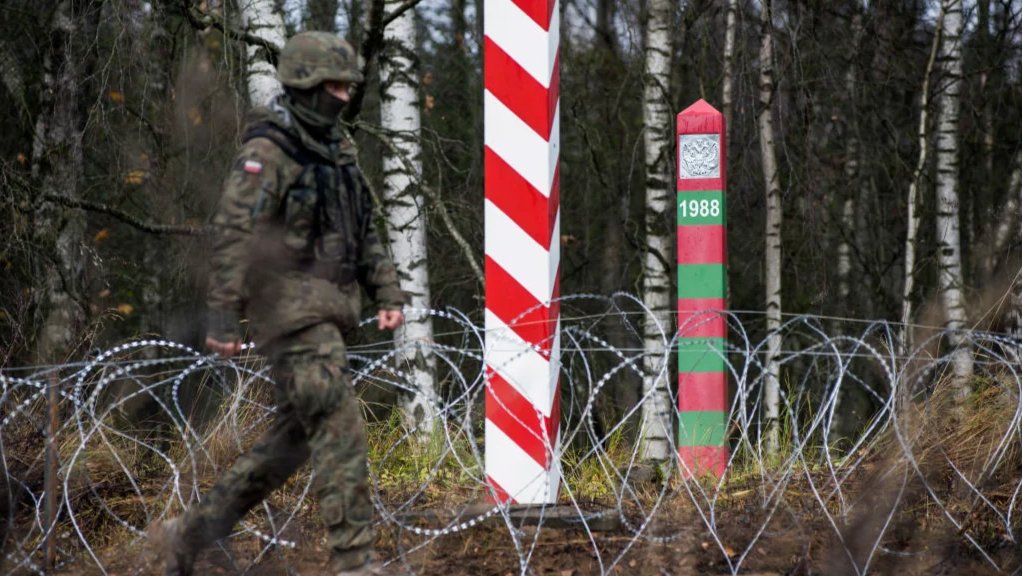A Ukraine-born Russian national, 35, is currently awaiting his trial in Russia’s Kaliningrad region for attempting to illegally cross the border after the mobilisation was announced in Russia and being detained by the Russian border control.
He was driven to this point after the Russian Pension Fund stripped his parents from their pensions, while the man himself would potentially be forced to take up arms against fellow Ukrainians.
Yuri Yatsentyuk was born in Ukraine’s Vinnytsia region one year after the Chernobyl disaster. He believes that the catastrophe caused a whole list of his diseases, including polyarthrosis, which is very rare for his age. His parents were fleeing the radiation and moved to Russia’s Kaliningrad region in 1988.

Yuri Yatsentyuk. A photo from the family archive
His father was a sailor, and his mother worked at different factories. After the Soviet Union collapsed, Yuri obtained a Russian passport, finished school, went to a university, and then served in the army. When he came back, he worked at an office of Russian oil and gas company Tatneft on the Baltic coast.
When Yuri’s grandmother died in Ukraine several years ago, his parents decided to go back to their native land. Yuri did not object.
“There was a flat left, they finalised the inheritance, obtained residence permits in Ukraine and stayed there,” the man says. “It was better for them there: food is cheaper than in Russia, they had their vegetable garden. They worked a little, lived, when they were short of money, my sister and I would chip in and send some money to them. My mum then started receiving her pension. She applied for it. Once a year she either had to go to Russia to a Pension Fund’s office or she could go to the Russian consulate. They confirmed there that she was alive.”
This life came to a grinding halt on 24 February when Russia launched hundreds of missiles at Ukraine.
“They [missiles] were not quite reaching them at first, and my parents were not rushing to be evacuated. We all hoped that it would be over soon,” Yuri explains.
The war truly struck Vinnytsia on the morning of 14 July when a Russian Kalibr missile landed in the centre of the city, killing 27 people, including three kids and three Ukrainian army officers.
Since then, Vinnytsia has been hearing air raid sirens pretty much all the time. Yuri sometimes can hear explosions when he calls his parents.
It’s become much more difficult to transfer money since the war began because all economic relations between the countries were severed. Yuri and his elder sister were sending money via Israel for a couple of months. However, the Pension Fund requested proof that Yatsentyuk’s mother is alive in May, and it was impossible to confirm it.
“The Russian consul left after the special military operation (as Moscow refers to the war in Ukraine — translator’s note) began. There was no opportunity to come here, the nearest evacuation corridor is hundreds of kilometres away, and my parents are not in any state to run anywhere. My mom has a lot of illnesses, ulcer bleeding recently began, we were getting medicine for her here and transferring it there. How to run? Where?” the man says. “And again, they are considered Russian, they have Russian passports. Who can guarantee that they won’t run into an idiot with a gun on their way. You know…”
The Russian side indeed did not take any steps to evacuate its citizens from Ukraine after the war broke out. Well, the evacuation was announced on 18 February in the so-called Donetsk and Luhansk people’s republics, and many people there had Russian passports.
However, all Russians who were in Ukraine when the war started were not taken care of at all. In the evening of 24 February, spokesperson for the Russian Foreign Ministry Maria Zakharova noted that Russians diplomats and consuls left Kyiv, Odesa, Kharkiv and Lviv before the missile attacks. She told others to rely on themselves to get out.
“As for where Russians citizens who are there now can appeal to, undeniably they can cross the border and seek help of relevant agencies in Russia or use other consul agencies in neighbour states,” she said.
The exact number of Russians who were stuck in Ukraine was never revealed. People tried to cross into Crimea, were heading towards Belarus. Very few of those who had a residence permit and money could go through the Polish border and move to the EU.
Yuri’s parents did not go anywhere and stayed with their childhood friends.
“Everyone knows everyone there; everyone helps others somehow. Now my parents have no money at all. They help other people with harvest. Their own vegetable garden is all they have to rely on,” the son says.
He received his draft note early in the morning of 23 September.
“I had just woken up, barely understood what was happening. Some guy brought it. I was sleepy and signed it, and only then came to my senses,” he remembers.

Yuri Yatsentyuk’s parents. Photo from the family archive
The first thought was: what’s going to happen to his parents? The small amounts of money that Yuri and his sister were collecting and sending to Vinnytsia were the only thing that sustained the two pensioners.
In August, the Pension Fund officially confirmed that it would not pay until Yuri’s mother identified herself. The nearest place where it can be done is Belarus’ Minsk, but she still needs to get there somehow. Money is an issue; arrangements must be made with some people.
Russia’s mobilisation ended all these plans: Yatsentyuk’s sister is married to a Russian serviceman, with each day her attempts to contact relatives in Ukraine were becoming more and more dangerous. And she could not take care of her mother who was stuck in a “hostile” state by herself.
Yuri believes that the crazy plan was born out of the blue, possibly, because the world around him got so crazy. He found recommendations online where and how people can cross the Russian-Polish border illegally.
He also contacted fraudsters who told him how they would help his parents to get to Poland after Yuri himself makes the journey.
On the evening of 27 September, he called a taxi, travelled to Russia’s Baltiysk, and boarded a ferry that took him to the Vistula Spit. Late at night, he disembarked and started making his way to Poland across the beach.
“There are two fences there… Barbed wire. I just crawled underneath them and started going further. I must have barely made 50 metres when I heard, “Stop!”. No, they did not beat me. They, of course, tied my hands and walked me off. No, it was not a neutral strip, it was still Russia. Therefore, my case has “attempted crossing of the state border” in it. I am not resisting really. What is the point if I was detained there,” the suspect says.
He spent three days in a detention centre in Baltiysk. He was charged with an administrative offence, but then the case received the attention of investigators. Yuri does not disclose the details of the interrogation and is now under recognisance not to leave the town.
When asked what pushed him to commit the crime, he says, “Despair.”
“Hear me out. Ok, who would take care of them [parents] if I had been taken to the army? They are there without any money. I had no idea how to help them.”
Support independent journalism
All independent media have been banned in Russia which makes our work not only challenging but outright dangerous. We need your support.
He does not even mention that his parents would be even more hurt by losing him in the war, as if this possibility does not even enter Yuri’s mind. When asked if he would be able to shoot at Ukrainians, he is shocked and silent. Then he responds with uncertainty:
“The only Ukrainian who I can possibly kills is myself.”
Maria Bontsler, Yatsentyuk’s lawyer, wants to be as clear and precise in wordings as possible, she does not want to have an additional charge for “discrediting the Russian army” thrown in there for her client. And even though Vladimir Putin recently admitted that he practically started a civil war, ethnic Ukrainians are still fighting in the war against Ukrainians. Everyone is.
“Legally, it’s all good: it’s a citizen, whatever their ethnicity is. But the moral side of it?” she says. “Many Russians with Ukrainian roots have relatives there. Shooting at them? This is a very big problem, not even mentioning that many Ukrainians who are ethnically Russian… This is a dilemma of fratricidal wars. And here we also have parents without a living, and an unfortunate son at the changing point in history. And the parents’ little house with constant “bangs” from Russian missiles all the time around.
“The child dies every day thinking that he can lose his parents. It is an eternal problem of a small person vs. big politics. The little person wants to live, love, and repay debts to his old parents. Here, everyone (she means parties to the Yuri’s criminal prosecution — author’s note) is surprised that the son loves his dad and mom so much that he is willing to put himself at risk. ‘What’s going to happen to them, they’ll survive somehow,’ he is told. But this is the very real thing which is much more important than political quarrels.”
Former civil activist Alexander V. (the editor’s office knows his name, the man obtained a political refugee status in a European country but is worried that his relatives would be persecuted in Russia — author’s note) fled to Europe several years ago by illegally crossing the border.
Since the war began, he says he’s been constantly receiving letters from fellow Russians, asking advice on how to do that. He says he does not do that because there is no universal guideline.
“For each route, you need to carefully study not just maps but also satellite images, border checkpoints, which territories are considered border-adjacent, which aren’t to avoid inspections (passport control in a border-adjacent area where you cannot be without a special permit from the border office of the FSB – author’s note).”
“So, it’s a lot of work. Instead of doing this, people choose to make arrangements with ‘gamekeepers’ and ‘guides’ who advertise their services, but they all work for the border control. And oftentimes they are actually border control officers, they even have a ‘reconnaissance’ department there,” Alexander says. “If you decide to do it illegally, you can only do it alone and only through forests, without even telling your relatives.”
Yuri Yatsentyuk had no plan whatsoever. An illegal migrant in Europe with Russian citizenship? His background would not warrant political asylum. By the way, he was promptly fired as soon as his work learnt about the administrative offence so that he doesn’t “shame the colleagues” according to his managers. The trial’s prospects are very uncertain: the charge potentially means that he can just be fined, but a sentence of up to two years is also on the table. Yuri has pled guilty and is hopeful for a mild verdict. He also wants to see his mother again. Preferably, not through the scope of a gun.
Join us in rebuilding Novaya Gazeta Europe
The Russian government has banned independent media. We were forced to leave our country in order to keep doing our job, telling our readers about what is going on Russia, Ukraine and Europe.
We will continue fighting against warfare and dictatorship. We believe that freedom of speech is the most efficient antidote against tyranny. Support us financially to help us fight for peace and freedom.
By clicking the Support button, you agree to the processing of your personal data.
To cancel a regular donation, please write to [email protected]

